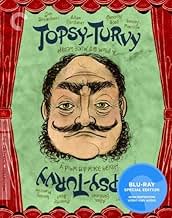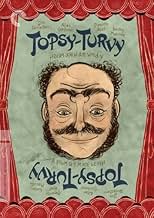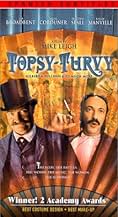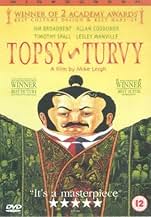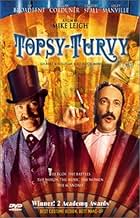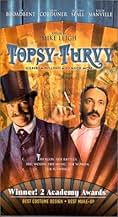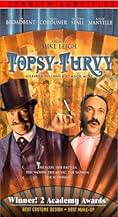CALIFICACIÓN DE IMDb
7.3/10
14 k
TU CALIFICACIÓN
En los 1880, Gilbert y Sullivan, famosos escritores de teatro musical, enfrentan una crisis creativa que amenaza su colaboración. Justo cuando parece que todo está perdido, encuentran inspir... Leer todoEn los 1880, Gilbert y Sullivan, famosos escritores de teatro musical, enfrentan una crisis creativa que amenaza su colaboración. Justo cuando parece que todo está perdido, encuentran inspiración para crear su obra maestra: El Mikado.En los 1880, Gilbert y Sullivan, famosos escritores de teatro musical, enfrentan una crisis creativa que amenaza su colaboración. Justo cuando parece que todo está perdido, encuentran inspiración para crear su obra maestra: El Mikado.
- Dirección
- Guionista
- Elenco
- Ganó 2 premios Óscar
- 13 premios ganados y 28 nominaciones en total
Bill Neenan
- Cook
- (as William Neenan)
- Dirección
- Guionista
- Todo el elenco y el equipo
- Producción, taquilla y más en IMDbPro
Opiniones destacadas
Not being a big fan of opera (of the comedic variety or otherwise), I chose to watch this movie as a period piece, hoping to see a lot of eccentric characters putting on even more eccentric theatre. That was easy, since the trailer for the film points in that direction entirely.
What I didn't expect was a thoroughly entrancing inside view of the Victorian theatre. Not to mention comprehensive. Everyone is covered in this - from the stage boy through the chorus through the leads and producers and assistant directors. The telling of the complex relationships between the directors (Gilbert and Sullivan) and the leads is particularly poignant - whether dealing with the actors' considerable egos or their individual popularity among the chorus, nothing presented doesn't ring true.
I loved everything about this movie. It's a great story, told wonderfully by all involved. It is truly a film of much love and craft.
And I expect I'll be attending the next run of the Mikado next time it comes to town.
What I didn't expect was a thoroughly entrancing inside view of the Victorian theatre. Not to mention comprehensive. Everyone is covered in this - from the stage boy through the chorus through the leads and producers and assistant directors. The telling of the complex relationships between the directors (Gilbert and Sullivan) and the leads is particularly poignant - whether dealing with the actors' considerable egos or their individual popularity among the chorus, nothing presented doesn't ring true.
I loved everything about this movie. It's a great story, told wonderfully by all involved. It is truly a film of much love and craft.
And I expect I'll be attending the next run of the Mikado next time it comes to town.
George Martin once talked about he and John Lennon once having a drink in a British pub. One of the regulars went over to the jukebox and selected "Yesterday." Lennon sighed, turned to Martin and said, "Don't suppose anyone's going to put in 'I am the Walrus?'" Martin went on to suggest that as frustrated as Lennon was of Paul McCartney's "Granny Music," he also couldn't deny McCartney's talent and the ease with which he came up with unforgettable melodies.
One senses the same kind of rivalry between Arthur Sullivan and William Gilbert in Mike Leigh's "Topsy-Turvy." Gilbert and Sullivan were both famous for their hilarious musical comedies in the mid to late 1880s, especially their early hits "H.M.S. Pinafore" and "The Pirates of Penzance." But the film takes place later in their career and things are not boding well for the duo. Sullivan (Alan Corduner) is growing increasingly frustrated with his collaborations with Gilbert, because he feels he is not growing as a composer. "I'm growing tired of these soufflés with Gilbert and his topsy-turvvydom."
Gilbert (Jim Broadbent) is feeling the crunch himself. His latest production with Sullivan has resulted in questions concerning Gilbert's creative spark, as in whether he has one. If that isn't enough, the Savoy Theatre tells the frustrated Sullivan that he and Gilbert are contractually obligated to one more show. Gilbert presents Sullivan with an idea. Sullivan responds that the idea sounds like a remake of an earlier play.
Then inspiration comes from the most unlikely of places. A Japanese Exhibit is being held in London and Gilbert's wife, Kitty (Lesley Manville) forces him to accompany her. Reluctantly Gilbert goes and, reenergized, he picks up a souvenir Samurai sword. He meets with Sullivan again and tells him his idea: "The Mikado." Thus is born Gilbert and Sullivan's last hit play.
The next half of the film deals with the backstage politics and adventures that go with putting on a production. It is here where "Topsy-Turvy" goes into full gear and really begins to shine. Broadbent and Corduner also shine in their respective roles, as well. And it is here where I really paid attention to Leigh's characterizations. The two never had a very friendly relationship and Sullivan was openly bored with Gilbert's silly plays. I always took it for Gilbert being a really witty and good-humored man, and Sullivan being a snob. But Leigh has Sullivan as a fun-loving hedonist and Gilbert being unpersonable and sarcastic. He uses humor as a weapon. The film forced me to look at the two of them in a new light, and more importantly, I bought it.
But Leigh's real achievement is in presenting his supporting cast as three-dimensional characters. There's Richard Temple (Timothy Spall) who plays the Mikado and suffers near-betrayal at the hands of his mentor, Gilbert. Actresses Jessie Bond (Dorothy Atkinson) and Lenora Braham (Shirley Henderson) personify the reluctant acceptance of wearing a kimono with no corset. Leigh brings the same care to this period drama as he has done for his smaller ensemble pieces.
And care is what "Topsy-Turvy" is all about. As much as Sullivan may frown at Gilbert's wit, he still wants to create the best possible product he can. There's a great scene where Gilbert is explaining "The Mikado" to Sullivan and Sullivan is truly enjoying the story. He's got such a look of glee on his face throughout the scene. Corduner does a great job of contrasting his Sullivan with Broadbent's Gilbert, especially in his scenes with the orchestra as he patiently explains the score with his players.
Broadbent, on the other hand, is an absolute joy as Gilbert. Gilbert may not be a likable character, but he knows what he wants and he is good at what he does. He may be short with everyone and unbending, but he gets results.
Leigh shows a clear love for the theatre here, and the details are amazing all the way from the theatre set to the costumes, nothing is out of place. He also keeps the action moving in the film which totals almost three hours but never feels like it. That's very hard to do.
To be honest, I thought Leigh was jumping on the "Shakespeare in Love" bandwagon, but the films couldn't be more different. "Shakespeare in Love" celebrates love burgeoning creativity. "Topsy-Turvy" deals with the love of creativity itself and shows how people of different temperaments and tastes can still get together and produce greatness.
Topsy-Turvy ****
One senses the same kind of rivalry between Arthur Sullivan and William Gilbert in Mike Leigh's "Topsy-Turvy." Gilbert and Sullivan were both famous for their hilarious musical comedies in the mid to late 1880s, especially their early hits "H.M.S. Pinafore" and "The Pirates of Penzance." But the film takes place later in their career and things are not boding well for the duo. Sullivan (Alan Corduner) is growing increasingly frustrated with his collaborations with Gilbert, because he feels he is not growing as a composer. "I'm growing tired of these soufflés with Gilbert and his topsy-turvvydom."
Gilbert (Jim Broadbent) is feeling the crunch himself. His latest production with Sullivan has resulted in questions concerning Gilbert's creative spark, as in whether he has one. If that isn't enough, the Savoy Theatre tells the frustrated Sullivan that he and Gilbert are contractually obligated to one more show. Gilbert presents Sullivan with an idea. Sullivan responds that the idea sounds like a remake of an earlier play.
Then inspiration comes from the most unlikely of places. A Japanese Exhibit is being held in London and Gilbert's wife, Kitty (Lesley Manville) forces him to accompany her. Reluctantly Gilbert goes and, reenergized, he picks up a souvenir Samurai sword. He meets with Sullivan again and tells him his idea: "The Mikado." Thus is born Gilbert and Sullivan's last hit play.
The next half of the film deals with the backstage politics and adventures that go with putting on a production. It is here where "Topsy-Turvy" goes into full gear and really begins to shine. Broadbent and Corduner also shine in their respective roles, as well. And it is here where I really paid attention to Leigh's characterizations. The two never had a very friendly relationship and Sullivan was openly bored with Gilbert's silly plays. I always took it for Gilbert being a really witty and good-humored man, and Sullivan being a snob. But Leigh has Sullivan as a fun-loving hedonist and Gilbert being unpersonable and sarcastic. He uses humor as a weapon. The film forced me to look at the two of them in a new light, and more importantly, I bought it.
But Leigh's real achievement is in presenting his supporting cast as three-dimensional characters. There's Richard Temple (Timothy Spall) who plays the Mikado and suffers near-betrayal at the hands of his mentor, Gilbert. Actresses Jessie Bond (Dorothy Atkinson) and Lenora Braham (Shirley Henderson) personify the reluctant acceptance of wearing a kimono with no corset. Leigh brings the same care to this period drama as he has done for his smaller ensemble pieces.
And care is what "Topsy-Turvy" is all about. As much as Sullivan may frown at Gilbert's wit, he still wants to create the best possible product he can. There's a great scene where Gilbert is explaining "The Mikado" to Sullivan and Sullivan is truly enjoying the story. He's got such a look of glee on his face throughout the scene. Corduner does a great job of contrasting his Sullivan with Broadbent's Gilbert, especially in his scenes with the orchestra as he patiently explains the score with his players.
Broadbent, on the other hand, is an absolute joy as Gilbert. Gilbert may not be a likable character, but he knows what he wants and he is good at what he does. He may be short with everyone and unbending, but he gets results.
Leigh shows a clear love for the theatre here, and the details are amazing all the way from the theatre set to the costumes, nothing is out of place. He also keeps the action moving in the film which totals almost three hours but never feels like it. That's very hard to do.
To be honest, I thought Leigh was jumping on the "Shakespeare in Love" bandwagon, but the films couldn't be more different. "Shakespeare in Love" celebrates love burgeoning creativity. "Topsy-Turvy" deals with the love of creativity itself and shows how people of different temperaments and tastes can still get together and produce greatness.
Topsy-Turvy ****
10markt-9
I loved this film, yet I have a hard time understanding many of the comments other viewers have made. I never liked G&S all that much, thought they were rather light weight stuff. Never liked the late Victorian era much either. Kind of a dull time, I thought. Musicals are definitely not my thing.
Yet this movie struck me as one of the greatest I have ever seen, right up there with Greed and Citizen Kane and all that lot. I suppose it's because I like period pieces, and I think it's damned difficult for anyone to draw an accurate -- or even an evocative -- picture of any time that is not their own. This movie does that, and it never even appears to strain so much as a single hair to do so.
In the end, this movie is deeply *humane.* Like many another Mike Leigh epic, the characters here are drawn in the round, flaws and talents all on view, just like real human beings. And he likes them all, even the stinkers. Likes them well enough to paint them as they are, not as cardboard figures.
If you like your characters pre-digested and redrawn larger than life and your plots full of twists and turns, you might find this movie tame. If you like people, you'll find it fascinating, funny, and true as gold.
And why do I rate it so highly? Because it hangs together so perfectly, all of a piece. It's luscious to look at, delightful to hear, and sweet as candy without ever once becoming saccharine or cheap.
Some reviewers complained you had to "already know" something to enjoy this movie: the music, the time, the language, the whatever. I say, all you have to know is human beings. If you find them interesting, you'll love this movie.
Yet this movie struck me as one of the greatest I have ever seen, right up there with Greed and Citizen Kane and all that lot. I suppose it's because I like period pieces, and I think it's damned difficult for anyone to draw an accurate -- or even an evocative -- picture of any time that is not their own. This movie does that, and it never even appears to strain so much as a single hair to do so.
In the end, this movie is deeply *humane.* Like many another Mike Leigh epic, the characters here are drawn in the round, flaws and talents all on view, just like real human beings. And he likes them all, even the stinkers. Likes them well enough to paint them as they are, not as cardboard figures.
If you like your characters pre-digested and redrawn larger than life and your plots full of twists and turns, you might find this movie tame. If you like people, you'll find it fascinating, funny, and true as gold.
And why do I rate it so highly? Because it hangs together so perfectly, all of a piece. It's luscious to look at, delightful to hear, and sweet as candy without ever once becoming saccharine or cheap.
Some reviewers complained you had to "already know" something to enjoy this movie: the music, the time, the language, the whatever. I say, all you have to know is human beings. If you find them interesting, you'll love this movie.
Gilbert and Sullivan are a successful musical team writing their shows for the Savoy Hotel in London. However Sullivan is tired and is suffering from ill-health. During a bad bout he resolves to no longer write for the Savoy with Gilbert but instead to recover in France and then to strike out alone and write a grand opera. Gilbert meanwhile, is showing signs of fatigue coming up with plots that use the same devices to the same ends. However the two are contractually obliged to continue their relationship, a prospect both seem ill at ease with until Gilbert takes an afternoon off at an exhibition of Japanese culture, sowing the seeds of inspiration for The Mikado.
I honestly had never even heard of this film until the television premier in 2002, if you had told me Mike Leigh had made a film on such subject matter I would likely have laughed down my sleeve at such a suggestion. However I gave this a watch despite the fact I know little (or care little) for the works of Gilbert and Sullivan and worries bout the fact it was 160 odd minutes long! However the plot is sufficiently well delivered to take those who only know a little about the pair to keep up. By taking the snapshot of the Mikado to show their relationship the film takes away what could have been a rough, sprawling epic the snapshot works much better. The weaving of the production into the narrative, rather than all at the end, means that both sets of fans will be happy there is enough music to please those who came for that, but also enough plot within to drive the film.
Leigh does very well, mixing humour and telling drama with the music of the show. The production of the film (and the production!) are both very good and the detail is fine. The cast are all excellent. Broadbent is good as the straight-laced Gilbert and his chemistry with the enjoyable Corduner works throughout. The support cast are all good in singing and non-singing scenes I was surprised to see Spall carrying the tunes so well!
Overall this is a good film but I doubt that Gilbert & Sullivan will be much of a draw even now that it is on TV. However if you have the chance to watch it then you should push through your reservations and give it a try it is engaging and humourous enough to overcome a lack of knowledge (or interest) in the pair's work.
I honestly had never even heard of this film until the television premier in 2002, if you had told me Mike Leigh had made a film on such subject matter I would likely have laughed down my sleeve at such a suggestion. However I gave this a watch despite the fact I know little (or care little) for the works of Gilbert and Sullivan and worries bout the fact it was 160 odd minutes long! However the plot is sufficiently well delivered to take those who only know a little about the pair to keep up. By taking the snapshot of the Mikado to show their relationship the film takes away what could have been a rough, sprawling epic the snapshot works much better. The weaving of the production into the narrative, rather than all at the end, means that both sets of fans will be happy there is enough music to please those who came for that, but also enough plot within to drive the film.
Leigh does very well, mixing humour and telling drama with the music of the show. The production of the film (and the production!) are both very good and the detail is fine. The cast are all excellent. Broadbent is good as the straight-laced Gilbert and his chemistry with the enjoyable Corduner works throughout. The support cast are all good in singing and non-singing scenes I was surprised to see Spall carrying the tunes so well!
Overall this is a good film but I doubt that Gilbert & Sullivan will be much of a draw even now that it is on TV. However if you have the chance to watch it then you should push through your reservations and give it a try it is engaging and humourous enough to overcome a lack of knowledge (or interest) in the pair's work.
10Fab4Fan
TOPSY-TURVY, director Leigh's spectacularly entertaining look at the lives and times of the nineteenth-century British duo that gave the world such musical treasures as The Pirates of Penzance and HMS Pinafore. Leigh's film finds G & S in 1884 at a creative impasse following the disappointing reception of their new flop operetta, Princess Ida. Sullivan (Allan Corduner), tired of writing music for the increasingly trite and repetitive librettos of Gilbert (Jim Broadbent), wants to give up their lucrative partnership and write "serious" grand opera. But when an exhibition of Japanese art and culture travelling through London inspires Gilbert to begin writing The Mikado, both men see the opportunity to create something unique and extraordinary. Praise for this stunning film must extend from top to bottom, beginning to end. The music, of course, is wonderful and ever present. The costumes, sets and cinematography are exemplary in their attention to atmosphere and detail. Leigh's script and direction not only bring the period to life, but make it crackle with drama, wit, and social comment. And the performances are fabulous, notably the magnificent Broadbent as mercurial Gilbert; Corduner, warm and charming as the more sweet-natured Sullivan; and Leigh regular Timothy Spall (SECRETS & LIES) as a veteran actor fearful that his big number may be cut. This is quite simply one of the most vastly entertaining, joyous and fascinating films ever made about the creative process. I actually saw it twice within a three-day period and wasn't bored for one second of either viewing!
¿Sabías que…?
- TriviaNot only did all the actors do their own singing, but everyone in the cast, including the pit orchestra and the actors who play instruments in the film, actually played the music they are seen to play.
- ErroresThis well known quote from the film is a factual mistake: "If you wish to write a Grand Opera about a prostitute, dying of consumption in a garret, I suggest you contact Mr Ibsen in Oslo. I am sure he will be able to furnish you with something suitably dull". The city of Oslo got the name in 1925 - a long time after Ibsen's death in 1906. During Ibsen's lifetime, the capital of Norway was called Kristiania.
- Citas
Helen Lenoir: The more I see of men, the more I admire dogs.
- Créditos curiososThe credit for "Location Vehicles" is misspelled "Location Vechicles".
- Bandas sonorasIf You Give Me Your Attention
from "Princess Ida"
Music by Arthur Sullivan
Lyrics by W.S. Gilbert
Performed by Martin Savage and Chorus
Selecciones populares
Inicia sesión para calificar y agrega a la lista de videos para obtener recomendaciones personalizadas
- How long is Topsy-Turvy?Con tecnología de Alexa
Detalles
- Fecha de lanzamiento
- Países de origen
- Idiomas
- También se conoce como
- Mike Leigh Untitled
- Locaciones de filmación
- Richmond Theatre, 1 Little Green, Richmond, Greater London, Inglaterra, Reino Unido(Savoy Theatre, London, England, UK)
- Productoras
- Ver más créditos de la compañía en IMDbPro
Taquilla
- Presupuesto
- GBP 10,000,000 (estimado)
- Total en EE. UU. y Canadá
- USD 6,208,548
- Fin de semana de estreno en EE. UU. y Canadá
- USD 31,387
- 19 dic 1999
- Total a nivel mundial
- USD 7,804,439
- Tiempo de ejecución
- 2h 40min(160 min)
- Color
- Mezcla de sonido
- Relación de aspecto
- 1.66 : 1
Contribuir a esta página
Sugiere una edición o agrega el contenido que falta



